- Clone
- P4D1 (See other available formats)
- Regulatory Status
- RUO
- Isotype
- Mouse IgG1, κ
- Ave. Rating
- Submit a Review
- Product Citations
- publications
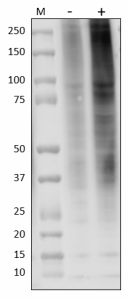
-

Whole cell extracts (15 µg protein) from HeLa cells untreated (-) or treated with 10 µM MG-132 for 10 hours (+) were resolved by 4-12% Bis-Tris gel electrophoresis, transferred to a PVDF membrane, and probed with 0.125 µg/mL (1:4000 dilution) of purified anti-Ubiquitin antibody (clone P4D1) overnight at 4°C. Proteins were visualized by chemiluminescence detection using HRP goat anti-mouse IgG antibody (Cat. No. 405306) at a 1:3000 dilution. Lane M: Molecular weight marker. -

Mouse recombinant ubiquitin was resolved by electrophoresis, transferred to nitrocellulose and probed with anti-Ubiquitin antibody, clone P4D1. Proteins were visualized using a goat anti-mouse secondary conjugated to HRP and a chemiluminescence detection system.
| Cat # | Size | Price | Quantity Check Availability | Save | ||
|---|---|---|---|---|---|---|
| 646301 | 25 µg | 100€ | ||||
| 646302 | 100 µg | 212€ | ||||
Ubiquitin is a highly-conserved small protein expressed in all eukaryotes. It is involved in a post-translation modification of proteins called ubiquitination of proteins by the covalent attachment (via an isopeptide bond) of one or more than one ubiquitin monomers. Ubiqutination controls the protein degradation, stability and intracellular localization of many proteins.
Product DetailsProduct Details
- Verified Reactivity
- All Species
- Antibody Type
- Monoclonal
- Host Species
- Mouse
- Immunogen
- Denatured glutaraldehyde cross-linked ubiquitin IgG complex
- Formulation
- Phosphate-buffered solution, pH 7.2, containing 0.09% sodium azide.
- Preparation
- The antibody was purified by affinity chromatography.
- Concentration
- 0.5 mg/ml
- Storage & Handling
- The antibody solution should be stored undiluted between 2°C and 8°C.
- Application
-
WB - Quality tested
IP, IHC - Reported in the literature, not verified in house - Recommended Usage
-
Each lot of this antibody is quality control tested by Western blotting. For Western blotting, the suggested use of this reagent is 0.12 to 0.5 µg per ml. It is recommended that the reagent be titrated for optimal performance for each application.
- Application Notes
-
This antibody recognizes ubiquitin, polyubiquitin, and ubiquitin-conjugated proteins. The ubiquitin protein is extremley well conserved and thus the antibody has extensive species cross-reactivity from yeast to human. This antibody was specifically developed to detect ubiquitin and ubiquitin-substrate conjugates by immunoblotting. Because the antibody recognizes a denatured epitope, it is known to not work in immunoprecipitation or immunostaining applications.
-
Application References
(PubMed link indicates BioLegend citation) -
- Magnaudeix A, et al. 2013. Neurobiol Aging. 34:770. PubMed.
- Product Citations
-
- RRID
-
AB_1659269 (BioLegend Cat. No. 646301)
AB_1659269 (BioLegend Cat. No. 646302)
Antigen Details
- Structure
- Consists of 76 amino acids and has a molecular mass of about 8.5 kd. Highly conserved among all eukaryotic species.
- Biology Area
- Cell Biology, Neurodegeneration, Neuroscience, Neuroscience Cell Markers, Protein Trafficking and Clearance, Ubiquitin/Protein Degradation
- Molecular Family
- Autophagosome Markers
- Antigen References
-
1. Kahana, et al. 1999. Mol. Cell Biol 19:6608
2. Ciechanover A, et al. 1998. EMBO J 17:7151
3. Xu P, et al. 2008. Analytical Chemistry 80:3438 - Gene ID
- 6233 View all products for this Gene ID
- UniProt
- View information about Ubiquitin on UniProt.org
Other Formats
View All Ubiquitin Reagents Request Custom Conjugation| Description | Clone | Applications |
|---|---|---|
| Purified anti-Ubiquitin | P4D1 | WB,IP,IHC |
| Direct-Blot™ HRP anti-Ubiquitin | P4D1 | WB |
| Biotin anti-Ubiquitin | P4D1 | WB |
Customers Also Purchased
Compare Data Across All Formats
This data display is provided for general comparisons between formats.
Your actual data may vary due to variations in samples, target cells, instruments and their settings, staining conditions, and other factors.
If you need assistance with selecting the best format contact our expert technical support team.
-
Purified anti-Ubiquitin

Mouse recombinant ubiquitin was resolved by electrophoresis,... 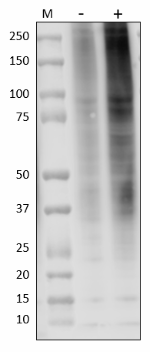
Whole cell extracts (15 µg protein) from HeLa cells untreate... -
Direct-Blot™ HRP anti-Ubiquitin
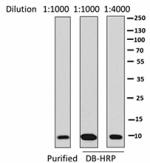
Recombinant mouse Ubiquitin (100 ng) was resolved by electro... -
Biotin anti-Ubiquitin
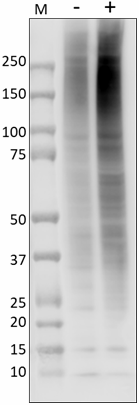
Whole cell extracts (15 µg protein) from HeLa cells untreate...
 Login / Register
Login / Register 




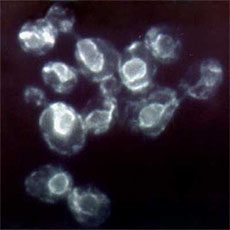
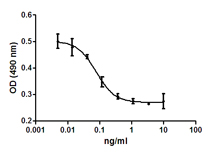
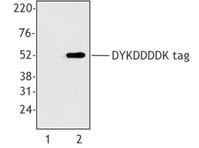




Follow Us